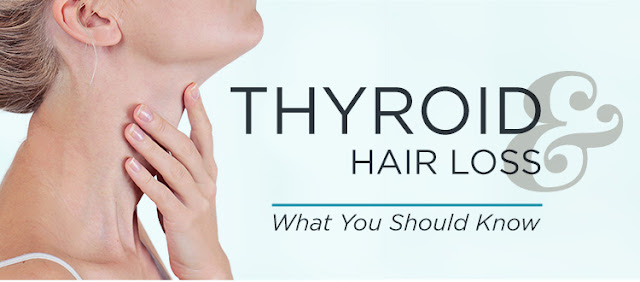Thyroid problems arise when your thyroid gland either produces insufficient or excessive amounts of specific hormones.
Hypothyroidism,
or an underactive thyroid, can produce a variety of symptoms, including weight
gain and tiredness. Because hypothyroidism develops slowly, many patients may
not notice symptoms until months or years later. Hyperthyroidism, or an
overactive thyroid, can result in symptoms ranging from weight loss to anxiety.
Both
of these diseases might result in dry, brittle hair or thinning hair on your
scalp and body. Continue reading to find out what you can do if your thyroid
issue is causing hair loss.
What exactly is the relationship
between your thyroid and your hair?
Thyroid
problems, if severe and untreated, can result in hair loss. Understanding how
these factors cause hair loss necessitates knowledge of how hair develops.
● Hair begins to grow at the
root, which is located at the bottom of your hair follicle on your scalp.
● Blood vessels in your scalp
feed the root, causing additional cells to form and the hair to grow.
● Hair grows up and out of your
skin. It travels via oil glands, which aid in keeping it smooth and glossy.
When
hormone synthesis, especially hormones T3 and T4 Source, is disturbed, it
impacts other functions in the body. This involves the growth of hair from the
root. Hair falls out and is not always replaced by new growth, leading in
thinning throughout your scalp and other places such as your eyelashes.
Thyroid-related hair loss symptoms
Hair
loss can occur gradually in hypothyroidism and hyperthyroidism. You may not
notice any lost patches or bald areas. Instead, your hair may appear thinner
throughout.
Every
day, you lose between 50 and 100 hairs from your head. If regular hair
development is disrupted, hairs are not replaced and uniform hair loss may
result.
The
excellent thing is that hair loss caused by thyroid disorders is usually very
temporary. Even if you start taking medications to treat your illness, you may
have hair loss. Some people are concerned that the medications are causing hair
loss, although this may be due to the hair's natural life cycle.
Treating The Problem
Mild
thyroid problems do not usually result in hair thinning. As a consequence,
working with your doctor to treat your condition with medication may maintain
your hair thicker or regenerate growth. Because hair takes time to form and
grow, results are unlikely to be instant.
Among
the possible medicines are:
● levothyroxine
(hypothyroidism)
● methimazole with
propylthiouracil (hyperthyroidism)
● Beta-agonists
(hyperthyroidism)
While
you're taking medicine, your doctor will keep an eye on your thyroid levels. Surgery
may be required in some situations.

Your blog contains bunches of important information. It is a genuine and gainful article for us. Appreciative to you for sharing an article like this.Oway Purifying Hair Bath For Oily Scalps
ReplyDelete